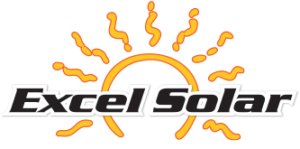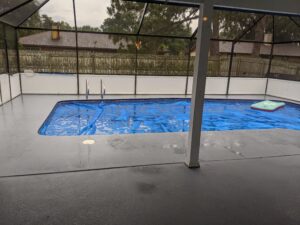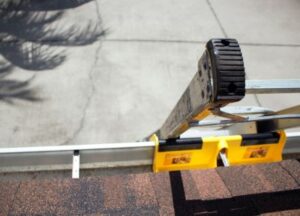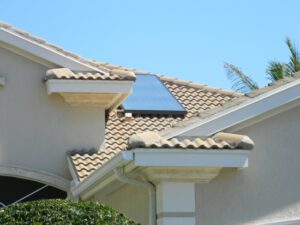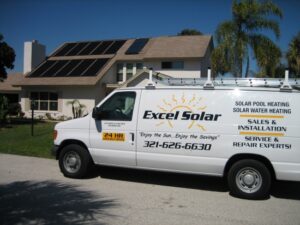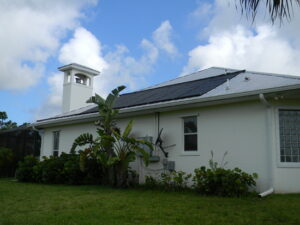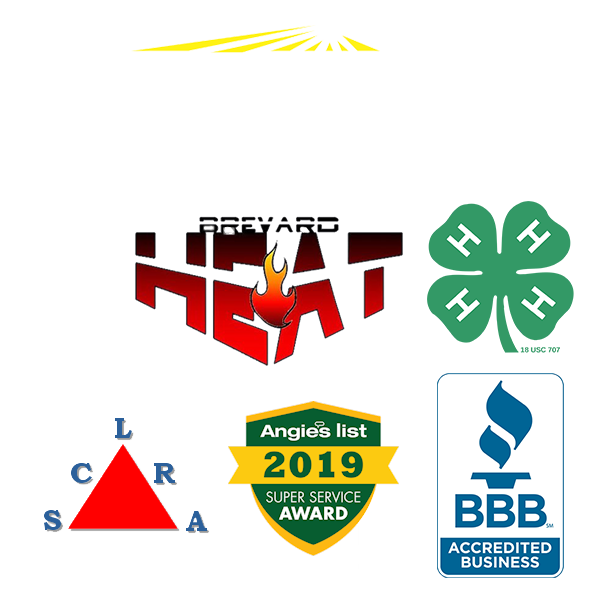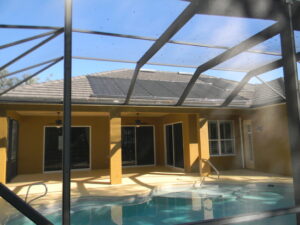
Do you have air bubbles in your pool? Maybe it’s the kids? Is grandpa in the pool? Want to blame it on the dog? Let’s talk about this. If you have a solar pool heater and experience air bubbles surging from the return jets in the morning hours, this is probably OK. It’s perhaps an indication that your solar heating system was correctly installed. This stream of air bubbles should only last a couple of minutes. The reason for this surge of air bubbles from the return jets is the displacement of air with water in the solar panels. A professionally installed solar pool heating system should drain the water from the panels every night. The water simply drains back into the pool after your pump turns off for the night.
Excel Solar systems are designed with a “VRV” (vacuum relief valve) at the highest point within the roof plumbing. This valve is held closed by a spring and your pump pressure while the system is operating every day. Only when your pool pump turns off for the evening does this valve come into play. When the pump shuts off, the pressure within your pool plumbing system goes to zero. The pressure will try to go negative and pull a vacuum on the system. This “vacuum” effect is what pulls on the VRV spring and forces the valve to open. This will introduce air into the pipe at the highest point within your pool plumbing and release the water, allowing it to drain back into the pool. Have you ever tried to keep water or soda in a drinking straw by holding your finger over the hole and lifting the straw out of your drink? If you keep the top hole of the straw tightly covered with your finger, the fluid magically stays in the straw and defies gravity. As soon as you remove your finger from the straw’s top opening, the fluid spills out. This example illustrates the same thing that is happening within your solar pool heating system. The VRV is acting like a giant finger blocking air from being introduced into the solar plumbing top. When the pump turns off, the VRV opens and introduces air into the system’s highest point and releases the water.
Why are our solar pool heating systems designed this way? Well, this does equalize pressure and relieve the “vacuum pressure” on the system. The system shouldn’t have that vacuum pressure, but the real reason for the VRV and the system draining back every night is freeze protection. Yes, I know that sounds a bit strange in central Florida, but systems are designed to drain back primarily to protect against freeze damage. Although it may not freeze every season, our systems are designed to drain back 365 nights a year. If the systems did not drain and water was left in the panels on your roof, when the temperature drops below freezing and ice forms in the solar panels, they can rupture. When water freezes, it expands, and that expansion can severely damage solar panels.
When you see a surge of air bubbles coming from the return jets of your pool in the morning hours, it usually means that the system is operating correctly. If you see a constant stream of air bubbles coming from one or more of the jets all day long while the pump is running, you probably have a problem that will require a service call. This small stream of constant bubbles usually indicates a leak within your pool plumbing system on the suction side of the pump. No water is escaping (while the pump is running), but the air is being sucked in at the leak source. That air runs through the entire system until it exits at the return jets, where you notice it in your pool. Most of these suction leaks end up being a loose-fitting at the pump. All that pump vibration can loosen up the fittings at the pump connections, and this is the result. On rare occasions, when you have constant air bubbles, it can be a broken fitting or cracked pipe underground within the suction pipe. This is not as easy to fix and usually requires a professional leak detecting company and some digging.
So, let’s review: If you have a solar pool heating system and you experience a surge of air bubbles upon the system startup every morning, and it lasts a couple of minutes, the system is probably doing what it is designed to do. If you have a constant stream of air bubbles all day, every day, you probably need a service call from your pool company. This will likely be a simple repair the tech can do within about one hour. Let’s hope the tech does not have to call in the leak detecting company. If you ever have questions about your solar heating system, Excel Solar is just a phone call or email away (321-626-6630 and Office@ExcelSolar.com). We are always happy to answer your questions. Now go, enjoy that solar-heated pool!
C. Russell Moutsatsos
President of Excel Solar, Inc.
State Certified Solar Contractor (License #CVC56933)
